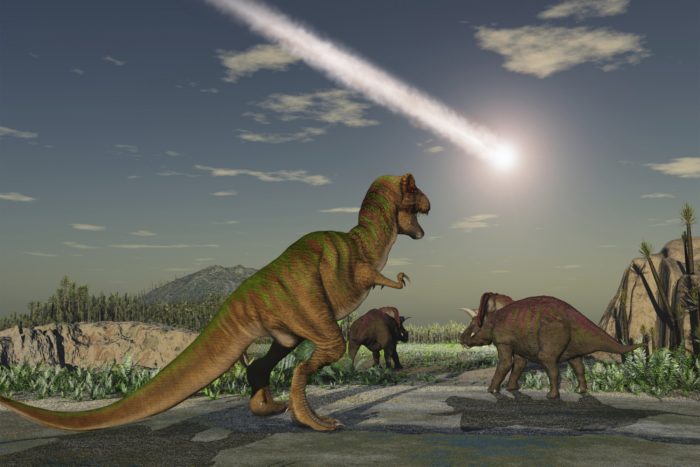Jan 23 2020
Asteroid Not Volcanism Killed the Dinosaurs
 The popular belief is that an asteroid impact caused the mass extinction at the K-Pg (formerly K-T) boundary 66 million years ago. This is the mass extinction that killed off the non-avian dinosaurs along with 75% of species on Earth. However, in reality there is a raging scientific debate about the exact causes of the extinction event. The two contenders are the asteroid impact, which we know happened right at that time, and extreme volcanism at the Deccan traps in what is now India.
The popular belief is that an asteroid impact caused the mass extinction at the K-Pg (formerly K-T) boundary 66 million years ago. This is the mass extinction that killed off the non-avian dinosaurs along with 75% of species on Earth. However, in reality there is a raging scientific debate about the exact causes of the extinction event. The two contenders are the asteroid impact, which we know happened right at that time, and extreme volcanism at the Deccan traps in what is now India.
Scientists fall along a spectrum in this debate. At one end there are those who believe the asteroid was the main event, and the volcanic eruptions played little to no role. At the other end are those who believe that climate change caused by the volcanoes, with both global warming from the CO2 and acidification of the oceans, was the main driver of extinction. The asteroid impact, at most, was the coup de grace. In between are those who feel that both events were important to extinction to varying degrees, and we’re just trying to sort out their relative contributions.
The evidence has gone back and forth on this debate, although I think it has been strongly favoring the asteroid impact as the dominant factor. A new study contributes to this debate, and heavily favors the asteroid impact. In fact, the authors argue that their evidence suggests the volcanism at the Deccan traps played no role at all in the extinction. The modeled the outgassing from the Deccan traps and compared the models with the evidence to see which one fit the best. This is what they found:
We found support for major outgassing beginning and ending distinctly before the impact, with only the impact coinciding with mass extinction and biologically amplified carbon cycle change. Our models show that these extinction-related carbon cycle changes would have allowed the ocean to absorb massive amounts of carbon dioxide, thus limiting the global warming otherwise expected from postextinction volcanism.
Essentially the outgassing from the Deccan traps started, according to their model that best fits the evidence, 350,000-200,000 years prior to the impact and extinction. This caused a global warming event of about 2 C, which further lead to a migration of many species toward the poles. However, the outgassing and warming stopped prior to the extinction, the Earth cooled back to its prior baseline, and the various species returned to their previous locations. So the ecosystem has returned to its prior baseline, without any mass extinction, and then the asteroid hit and caused the mass extinction all by itself.
Their model also addresses a separate question. The asteroid impact itself caused secondary volcanism and another round of outgassing, but this time there wasn’t a warming event. Why not? Their model suggests that the mass extinction itself was a major disruption to the environment (of course) that changed the carbon cycle and allowed for the oceans to absorb a massive amount of CO2 more than they would have. Because the oceans absorbed most of the CO2 it did not build up in the atmosphere and cause warming.
Meanwhile, other studies have been showing how deadly that asteroid impact was (not that this is any surprise). The power of the impact was recently estimated at 10 billion Hiroshima-level atomic bombs. As an aside, I’m not sure why that is now the universal units by which powerful events are measured. I guess it makes for good headlines. The impact also released 325 billion metric tons or more of sulfur. All of this sulfur, and the CO2 absorption, rapidly acidified the world’s oceans, contributing to the mass extinction and delaying the recovery of life. This analysis also concludes that the asteroid was the main event that caused the mass extinction.
From all of this it seems like the Deccan traps eruptions are mostly a red herring – a major ecological event that happened around the same time at the K-Pg extinction event, but ultimately having nothing to do with it. Interestingly, the science has come full circle, back to the impact hypothesis. So anyone not paying attention to this scientific debate is now again correct in believing that the dinosaur extinction was caused by an asteroid. But of course, science is about the debate and the process that is used to resolve it, not the conclusion. The debate is far more interesting.






